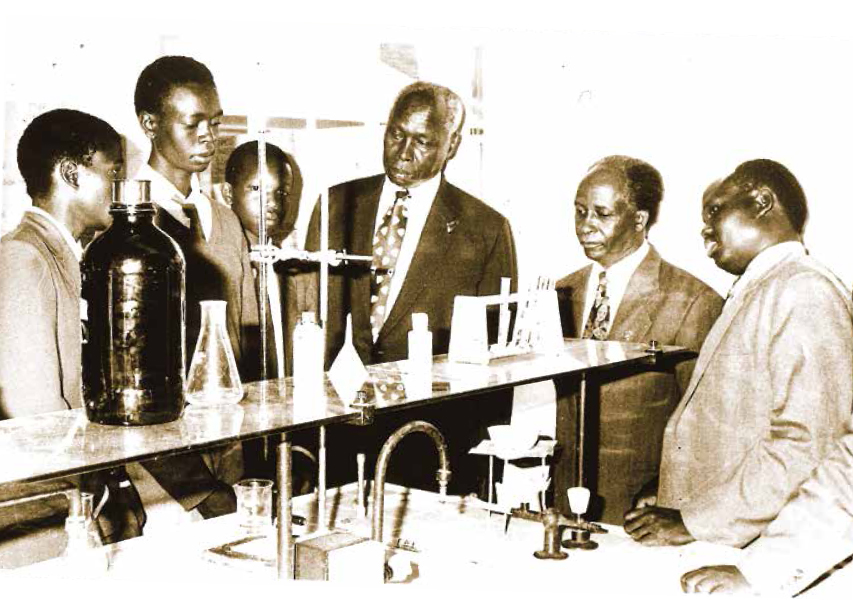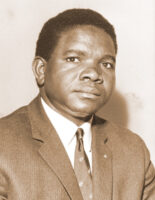
Mathews Joseph Ogutu, the Minister for Tourism and Wildlife in President Jomo Kenyatta’s last Cabinet, was born in Uyundo Village, Sega, in Siaya District in 1931. He was an ordinary boy whose father, Julius Oduor, would later be appointed as an assistant chief. Even as Ogutu walked to Uyundo Primary School and later crossed the border to Uganda for his secondary school education at a time when the world braced itself for World War II, he displayed little with which to lay claim to any measure of fame.
On completing his education, he returned to Kenya and started work as a building contractor, criss-crossing Ugenya Constituency. After working for a number of years, mainly building houses, he got a job as a site engineer with a British firm, Mowlem Construction Company, and was posted to Uganda. Ogutu worked as an engineer at the Kilembe mines, which elevated his social status back home in Ugenya, especially after he married his first wife, Josephine. He later married three more women and went on to have 14 children.
Never one to do things in half measures, Wuod lando (son of the light-skinned woman), as Ogutu was popularly known, made a major statement when he built himself a five-bedroom bungalow in Uyundo in 1964, making him the talk of the entire neighbourhood. As he explained in a 1996 interview with the Daily Nation, the house was built in readiness for his retirement.
This ‘palace’ attracted the attention of Ugenya, as it was renovated every three years by the man who many considered blunt to the point of being arrogant. Ogutu’s visits to his rural home increased when Mowlem transferred him to Nairobi, giving him an opportunity to consolidate a future political base.
The 1969 fallout between President Jomo Kenyatta and his Vice President, Jaramogi Oginga Odinga, presented Ogutu with an opportunity to try his hand at elective politics. He resigned from Mowlem to contest the Ugenya parliamentary seat in Nyanza Province. That was also the year when the only Opposition party, the Odinga-led Kenya People’s Union (KPU), was banned and its leaders detained following a public showdown between Kenya African National Union (KANU) and KPU leaders in Kisumu. Ogutu and William Odongo Omamo of Bondo Constituency stepped in to fill the political vacuum.
Kenyatta appointed Ogutu Assistant Minister for Local Government where he worked for five years before he was elevated to Minister for Tourism and Wildlife. In his contribution to a debate on the presidential address during the opening of Parliament on 6 February 1970, the Minister said: “Mr Deputy Speaker, Sir, I join hands with the honourable colleagues to thank His Excellency the President for his exposition of public policy when he addressed this House.
“I would like to touch a bit on the tourism industry. We welcome the President’s mention in his well-made speech about the expansion of the Kisumu Airport. We request the Government to speed up the expansion and include Kisumu Township and other areas in Nyanza Province in the tourist market so that we can benefit also from the tourism industry like other parts of the country.
“On roads, Mr Deputy Speaker, we are pleased with the preparations being made to tarmac the Yala-Busia road. This road passes through congested areas and is used by heavy traffic. We request the Government that this road be given expediency in raising it to bitumen standard.”
Turning to the Kenyanisation programme, Ogutu said a lot more needed to be done to make it a reality: “We have young men and women, school-leavers, who are desperate. I believe that the Kenyanisation programme at the moment is merely being used to register the job-seekers and I do not think the Government is doing much.”
He welcomed the President’s plan to introduce an industrial levy, saying it would mark a new era of compulsory training and industrial cooperation that would provide training programmes with grant schemes. Ogutu said the proposed compulsory levy would change national training patterns and proposed that training should be taken away from companies and industrial organisations and instead be made a joint Government-industry responsibility, with every establishment being compelled to pay for training.
One of his biggest achievements as Minister for Tourism was to convince the Government that Kenya had more to gain by banning the sale of game trophies. The President made the announcement on Madaraka Day in 1977, directing that it be implemented in three months.
In 1996, Ogutu asserted that he was proud to have served Kenya and Kenyatta loyally and to the best of his ability. “I believe I lived up to the expectations of my voters in Ugenya and Mzee Kenyatta. Voters do not owe you a living; you owe them a service if they elect you.”
Contributing to a debate on the 1971 Budget Speech read by Minister for Finance Mwai Kibaki, Ogutu described it as “excellent” and said it balanced taxation. “I am a great believer in the growth of the Kenyan economy. In Kenya, we are well known as a predominantly agricultural country. The disappointing thing is that we have not balanced our agricultural economy.”
He recalled that in 1970, Kenyans had had to make do with imported yellow maize meal and that another maize shortage loomed in 1971. Rationing in the supermarkets meant that customers were only allowed to buy two packets of flour. He challenged his colleagues to plan for the agricultural sector if the country was to attain food self-sufficiency.
He blamed the food crisis on a colonial hangover, citing the Government policy of confining cash crops in the Rift Valley and parts of Central Province. With regard to the poor state of roads, Ogutu accused expatriate engineers of being ignorant of local weather conditions.
Ogutu’s political star started to fade on 30 June 1980, when the High Court nullified his election as Ugenya MP following a petition by his political opponent, Archbishop Stephen Ondiek. It was a dark day for Ogutu when the judges directed the Speaker of the National Assembly to declare his seat vacant and call a by-election. Ondiek beat him hands down at the ballot box.
After Kenyatta died, President Daniel arap Moi appointed Ogutu Chairman of the Cotton, Lint and Seed Marketing Board, in place of Odinga. He did not, however, stay long in the position; he resigned in 1983 to try and recapture the Ugenya seat but ended up losing to James Orengo, a lawyer who had just graduated from the University of Nairobi.
Recalling his Cabinet days in a media interview, Ogutu affirmed that they were satisfying and enjoyable because Kenyatta allowed everybody a “free hand policy” to use his skills to the fullest. He spoke fondly of the President: “Kenyatta was the founder of the nation and had the upper hand in politics, thus uniting us. We always worked as a team in the Cabinet. He was the most charismatic leader I have ever met. He also taught us to be one people and one country.”
Ogutu died on 4 October 1997 at the age of 66.
